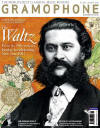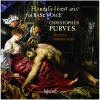Texte paru dans: / Appeared in:
*

GRAMOPHONE (01/2013)
Pour s'abonner /
Subscription information
Hyperion
CDA67842

Code-barres / Barcode : 0034571178424 (ID269)
Consultez toutes les évaluations recensées pour ce cd
~~~~ Reach all the evaluations located for this CD

Reviewer: Richard Wigmore
Purves joins Cohen’s new group for
wide-ranging Handel
Basses in the 18th century rarely enjoyed star billing. Public adulation, with fees to match, was usually reserved for temperamental sopranos and castratos. One of Handel’s basses, Gustavus Waltz, may even have served a spell as the composer’s cook. Yet, as this enterprising recital reveals, Handel wrote superb, varied music for several remarkable basses over his 50-year career, from the Neapolitan priest Antonio Manna, probable creator of Polifemo in the Italian serenata Aci, Galatea e Polifemo, to the anglicised German Henry Reinhold, his oratorio bass of choice from the late 1730s. In between, during his hectic years as opera composer-cum-director, Handel engaged two celebrated Italians: Giuseppe Maria Boschi, a baritone rather than bass who specialised in raging tyrants, and Antonio Montagnana, praised by the music historian Charles Burney for his ‘depth, power and mellowness, and peculiar accuracy of intonation in hitting distant intervals’.
No Handel aria trades in ‘distant intervals’ more spectacularly than Polifemo’s ‘Fra l’ombre e gl’orrori’, in which the oversexed cyclops compares himself to, of all things, a bemused butterfly. Handel later recycled this, in a slightly simplified version, for Montagnana in Sosarme. Unfazed, Christopher Purves sings the original, stunningly, expanding its two-and a-half octave compass (high tenor A in subterranean bass D) by inserting a fathomless low B flat in the da capo. But the result is no mere circus trick. Possessing in effect two voices in one — a ringing, incisive high baritone with a sonorous bass extension — Purves veils his tone to convey bemusement, even pathos.
Purves’s flair for specific characterisation enlivens every number on the disc. Egged on by Arcangelo’splenetic strings, he works himself into a rage worthy of Boschi in an aria from Riccardo Primo. Coloratura, here and elsewhere, is always precisely focused, wide leaps cleanly negotiated at speed. In ‘O ruddier than the cherry’ he delightfully suggests destructive lust barely contained beneath the would-be ingratiating veneer. Elsewhere Purves relishes the tortuous chromaticism of Lucifer’s ‘Caddi, è ver’ (La Resurrezione) and the genial swing of the ‘hunting’ aria from L‘Allegro, abetted by Roger Montgomery’s rollicking horn obbligato. He can be dulcet, too, whether in Claudius’s attempted seduction of Poppea in Agrippina or the arias for two chastened fathers, Abinoam (Deborah) and Gobrias (Belshazzar), the latter growing more intense and troubled as it proceeds. Trumpet and voice vie thrillingly in the perennial bass favourite, ‘Revenge, Timotheus cries’, while in the final number, Somnus’s ‘Leave me, loathsome light’, Purves evokes drowsiness and lassitude without recourse to a white, ‘yawned’ tone. Jonathan Cohen and Arcangelo savour the rich string textures here, typical of their feeling for colour throughout a recital that pays eloquent tribute to Handel’s boundless invention in composing for bass voice: a counter, as David Vickers suggests in his informative note, to the clichéd notion that his bass arias are all undifferentiated bluster.
Cliquez l'un ou l'autre
bouton pour découvrir bien d'autres critiques de CD
Click either button for many other reviews


